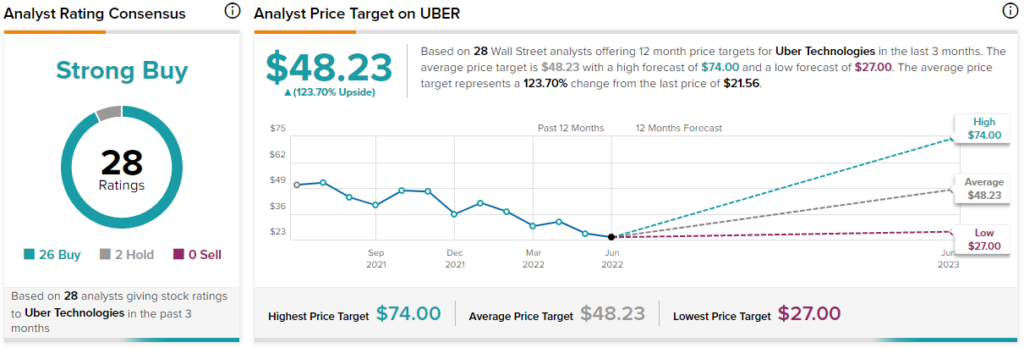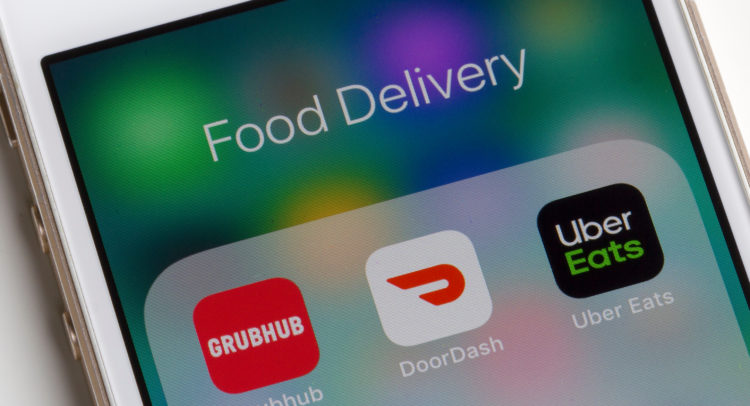The food-delivery stakes just got a lot hotter. Uber (UBER) and DoorDash (DASH) both took significant hits in today’s trading session so far. UBER stock is currently down 4.4%, and DASH stock is down 7.2%.
Elevate Your Investing Strategy:
- Take advantage of TipRanks Premium at 55% off! Unlock powerful investing tools, advanced data, and expert analyst insights to help you invest with confidence.
The biggest reason behind the losses has nothing to do with either company but rather with one of its main competitors, GrubHub. GrubHub just got a major note of support from no less than Amazon (AMZN), and now the competition is going to have to scramble to make up the difference.
The latest news slamming both companies is that Amazon took a 2% ownership stake in GrubHub, owned by Just Eat Takeaway (JTKWY). In exchange, Amazon added free GrubHub membership as one of the benefits of Amazon Prime.
Now, everyone with Prime service has access to GrubHub, assuming GrubHub is available in their area. Amazon also has the option to buy another 13% of GrubHub if a newly-released promotional effort works out.
Is it time to abandon Uber and DoorDash altogether? Although I was bullish before, I’m now shifting to neutral on both companies. Things may have been sketchy for food delivery before, but with Amazon joining the fray, that’s a seriously destabilizing element that will fundamentally shake up the field.
The last 12 months for Uber have been on a mostly steady downturn. Despite occasional recovery attempts, the company started off July 2021 around the $50 per share mark. Today, it’s closer to $20 per share, coming in around $22.
Meanwhile, DoorDash spent most of 2021’s second half gaining ground. It ultimately started a fall in mid-November 2021 that is still continuing to this day. DoorDash went from around $250 per share back then to just under $70 today.
Wall Street’s Take on UBER and DASH
Turning to Wall Street, Uber has a Strong Buy consensus rating. That’s based on 26 Buys and two Holds assigned in the past three months. The average Uber price target of $48.23 implies 123.7% upside potential.
Analyst price targets range from a low of $27 per share to a high of $74 per share.

As for DoorDash, it currently has a Moderate Buy consensus rating. That’s based on 11 Buys and 10 Holds assigned in the past three months. The average DoorDash price target of $106.37 implies 53.3% upside potential.
Analyst price targets range from a low of $67 per share to a high of $185 per share.

UBER’s Investor Sentiment is Much Better than DASH’s
The latest move will likely not be reflected in investor sentiment figures immediately. However, the early word suggests these two companies had very mixed propositions as far as what investors thought.
Smart Score Ratings
Uber currently has a ‘Perfect 10’ Smart Score on TipRanks, the highest level of “outperform,” implying that the stock has a great chance of outperforming the overall market.
Meanwhile, DoorDash has a Smart Score of 1 out of 10, the lowest level of “underperform,” implying the exact opposite of UBER stock.
Hedge Funds Like UBER Stock More
Hedge fund involvement figures are very different for the two companies as well. The TipRanks 13-F Tracker reveals that hedge funds bought an additional 19.8 million shares in Uber in the last quarter. That’s a reverse from the last quarter, where hedge funds sold shares.

Meanwhile, hedge funds sold three million shares of DoorDash last quarter. That marks the third consecutive quarter hedge funds sold shares of DoorDash.

Insiders are Buying UBER and Selling DASH
Insider trading at Uber is heavily weighted toward buying. In the last three months, corporate insiders added another $5.3 million in Uber shares to their portfolios. That builds on the year’s figures, with buyers leading sellers 61 to 44.
Meanwhile, insider trading at DoorDash is much more Sell-weighted. Not only did insiders sell off $7.8 million in shares in the last quarter, but that builds on the broader year’s figures as well. Sell transactions led Buy transactions at DoorDash by 126 to 31.
Retail Investors Seem Skeptical of Both Companies
As for retail investors who hold portfolios on TipRanks, they’re actually skeptical of both companies’ ability to perform. The number of TipRanks investors holding Uber in their portfolios was down 0.2% in the last seven days and down 0.3% in the last 30 days.
As for DoorDash, the number of investors holding its stock was down 0.4% in the last seven days and down 0.8% in the last 30 days.
A Bigger Problem for Some than for Others
Let’s not mince words. The addition of Amazon to the food delivery market will destabilize it significantly going forward. The only real question is by how much.
Here’s the problem in a nutshell: by adding GrubHub to its Amazon Prime package, Amazon has made Amazon Prime that much more appealing to its customers. That’s good news for Amazon. Amazon Prime figures were starting to flag anyway.
Back in April, Kiplinger offered up an article called “12 Good Reasons to Cancel Amazon Prime.” The combination of rising expenses and limited value has a negative impact on customers. CNBC also offered reasons Prime may not be helping some customers anymore.
Several stores have recently added same-day service to their delivery packages. That makes Prime’s two-day shipping a much less unique feature. When ubiquity replaces uniqueness, a competitive edge is lost.
So Amazon needed a way to augment Prime’s value, and it went with GrubHub. That’s all fine and well, assuming those Prime customers live in an area where GrubHub offers its service.
For Prime customers who don’t have access to GrubHub anyway—particularly rural-dwellers who use Amazon as an alternative to hundred-mile round-trip drives—it’s meaningless.
This only means so much to Uber and DoorDash, meanwhile. After all, they likely weren’t pursuing those stranded ruralites either. That means Amazon’s move only has so much impact on the overall market. However, it hits Uber and DoorDash disproportionately. GrubHub’s market is the exact same market they were pursuing.
This makes the market just a little smaller for all involved. This market already ran some serious risks with inflation destroying disposable income. Spiraling grocery prices made the cost of eating at home increase as well. Those aren’t prime conditions for restaurants or the food delivery services that supply them.
However, if GrubHub ends up becoming completely part of Amazon—Just Eat Takeaway has been looking to sell GrubHub since April anyway—GrubHub will be able to fall back on the broader Amazon market for support. Uber will have its ridesharing and other delivery functions. DoorDash, however, will be hit the hardest.
Concluding Views – Uber May Fare Better than DoorDash
I’m staying neutral on both Uber and DoorDash. It’s worth waiting to see how this whole thing settles. If Amazon buys out the remaining chunk of GrubHub, then that will make GrubHub potentially very hard to beat in the field.
Uber will have the best time of it. It has more than just its delivery functions to support it. DoorDash might completely fold unless it can branch out more effectively. With DASH’s valuation being higher than Uber’s anyway (on a price-to-sales basis), DoorDash will have a much harder time drawing investors.
I maintain that it’s worth letting the picture settle, but right now, Uber looks like it has the best chance of surviving an Amazon-backed GrubHub. DoorDash, meanwhile, will need to innovate heavily—and quickly—to beat the troubles ahead of it.
















